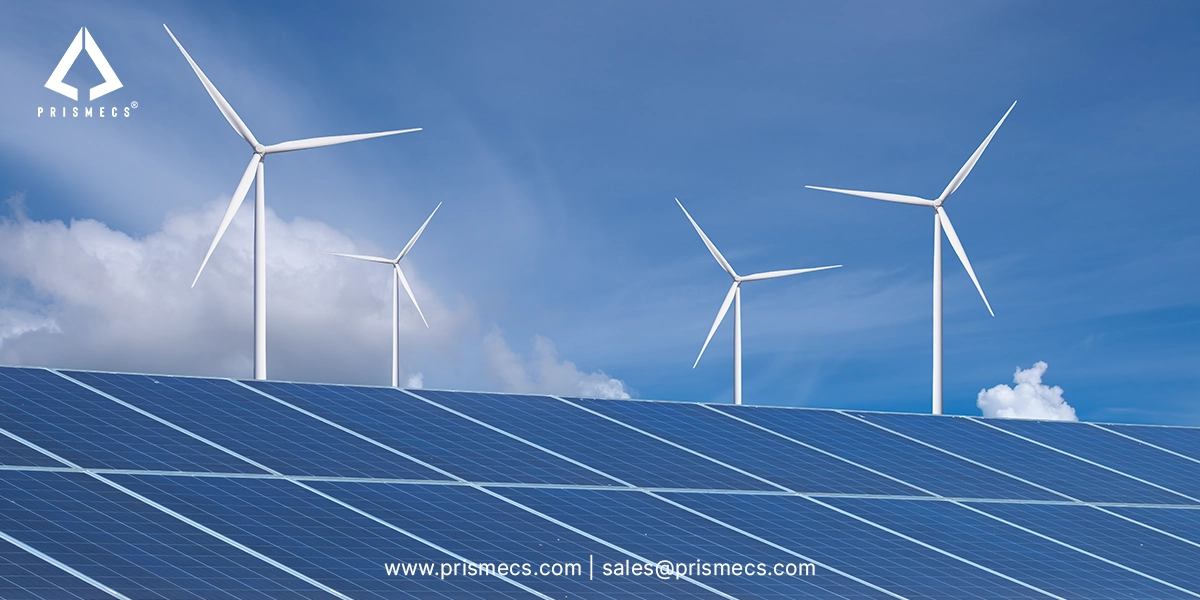
The world faces growing concerns about climate change and the need for sustainable development. Renewable energy has become a crucial part of global economic and environmental policies. Solar energy is a powerful driver of the energy transition. Other renewable sources include wind, hydro, and geothermal power.
Solar energy's impact goes beyond environmental benefits. A strong economic case exists for investing in this resource. In this blog, we will explore the financial implications of renewable energy, focusing on job creation, energy security, economic growth, and technological advancements.
Renewable Energy Growth: A Booming Sector
The renewable energy sector has experienced significant growth over the past few years. Solar power, along with wind energy, is at the forefront of this energy transition. The International Renewable Energy Agency (IRENA) anticipates a 9.6% increase in global capacity for 2024. We’re seeing substantial sector investments from both public and private players. Various industries are scaling up clean energy solutions. The development of large-scale renewable energy projects is driving this momentum, particularly in solar- and wind-powered plants.
And see the potential for these technologies to help drive economic growth. Nations, companies, and individuals are reshaping the economy by investing in these clean energy technologies. The Energy Information Administration expects renewable energy deployment to increase by 17% to 42 GW in 2024. This will account for almost a quarter of electricity generation (Deloitte).
This surge in investment is not just about protecting the environment; it’s also an opportunity for economic development. People are becoming more aware of climate concerns. Renewable energy technologies, like solar, can drive economic growth. Even oil and gas companies are diversifying their portfolios to include power generation through renewable energy sources.
Industrial Workforce and Operational Benefits
Investing in renewable energy at an industrial scale not only drives sustainability but strengthens operational capabilities. Large-scale solar, wind, and hybrid power installations require specialized technical teams for engineering, procurement, commissioning, and operations. By partnering with expert providers like Prismecs, industrial operators in data centers, oil & gas, metals & mining, and telecommunications can ensure reliable project execution while maintaining operational efficiency. These projects also strengthen regional supply chains, enabling faster deployment of critical infrastructure and minimizing downtime for mission-critical operations.
Energy Security and Industrial Reliability
For industries where uninterrupted power is critical, renewable energy solutions enhance operational resilience and grid stability. By integrating hybrid energy systems, on-site microgrids, and battery storage, companies in petrochemicals, data centers, and oil & gas can reduce dependency on volatile energy markets while maintaining continuous production. Prismecs’ turnkey EPC and O&M services ensure energy systems are designed, deployed, and maintained for maximum uptime, mitigating risks associated with power interruptions and safeguarding business continuity.
Driving Industrial Innovation and Operational Efficiency
Renewable energy is a catalyst for industrial modernization and technological advancement. Companies leveraging Prismecs’ expertise benefit from advanced energy storage, grid integration, and real-time monitoring solutions, optimizing energy efficiency and reducing operational costs. Our technology and consulting services empower industries like renewable power plants, metals & mining, and data centers to implement smart energy systems, increasing productivity while supporting sustainability goals. Industrial-scale deployment of solar, wind, and hybrid systems not only reduces carbon footprint but strengthens competitive advantage in global markets.
Read More: Top Trends Shaping the Future of Renewable Energy
Sustainable Industrial Operations and Long-Term ROI
Industrial organizations adopting renewable energy gain long-term operational and financial benefits. Reliable on-site power and hybrid systems reduce exposure to energy market volatility, ensuring stable production for industries like telecommunications, oil & gas, and metals & mining. In addition, environmentally responsible energy solutions support corporate sustainability goals, regulatory compliance, and resilience against climate-related disruptions. Prismecs’ EPC, O&M, and distributed energy solutions help industrial operators capture these benefits while ensuring mission-critical reliability.
Renewable Energy Market Size
The renewable energy market is expanding rapidly, presenting opportunities for industrial operators to modernize power infrastructure and reduce operational costs. Prismecs supports large-scale deployments across solar, wind, and hybrid projects, ensuring that companies in data centers, oil & gas, and metals & mining can capture growth opportunities while maintaining uptime. By investing in reliable industrial-grade energy solutions, businesses can secure predictable energy supply, reduce CAPEX and OPEX, and stay ahead in the competitive global energy landscape.
Challenges and Considerations
Renewable energy offers clear economic benefits, but we must overcome several challenges.
Initial Costs
The upfront costs of renewable energy projects can be high. These costs decrease over time due to advancements in technology and economies of scale. Nations and businesses are also investing in policies and incentives to make renewable energy more cost-effective for everyone.
Infrastructure and Grid Integration
Integrating renewable energy into existing power grids requires significant investment in infrastructure and grid modernization. Efficient grid management and energy storage solutions are essential for maintaining a reliable and stable power supply. Energy experts are revisiting nuclear energy solutions to create hybrid models that consistently supply large amounts of energy.
Policy and Regulatory Support
Strong government policies and supportive regulations play a crucial role in accelerating the growth of renewable energy. Governments, such as the Department of Energy, can foster innovation by providing incentives and setting targets. They can also create a favorable investment environment to ensure long-term success.
Conclusive Remarks
The economic impact of renewable energy is profound and far-reaching. It creates jobs, ensures energy security, and drives economic growth. Investing in renewable energy offers benefits across many sectors. As the world faces climate change and resource depletion, investing in renewable energy is a strategic decision.
Countries and businesses embracing renewable energy contribute to a sustainable future and unlock economic opportunities. As technologies continue to improve, the renewable energy sector is expected to drive economic growth and provide a stable global energy source.
How Prismecs Can Help with Renewable Energy Investments
Prismecs offer a blend of industry expertise and innovative solutions to maximize your returns while promoting sustainability. We provide reliable renewable infrastructure services for solar panels, wind turbines, and microgrids. Our services deliver valuable insights. Our experience even extends to hybrid systems that incorporate nuclear energy or traditional nuclear power plants to ensure energy consistency.
Partner with Prismecs today to secure your financial benefits and a sustainable future. Contact us today at +1 (888) 774-7632 or email us at sales@prismecs.com to embark on your sustainable journey.
Tags: Renewable Energy Solar Power Wind Energy Hydropower Geothermal Energy Biomass Energy Clean Energy Sustainable Power Green Energy Alternative Energy
recent posts

Power Generation
10 minutes read
How to Maximize Uptime in Power Generation Plants
Discover how Prismecs power plant maintenance helps operators prevent outages, protect revenue, and keep turbines running at peak performance. Learn h...

Renewables
8 minutes read
Opportunities in Renewable Energy Development
Explore Renewable Energy Development strategies focused on grid stability, faster deployment, and resilient power systems with Prismecs. Plan your nex...

Press Release
2 minutes read
Altaaqa Global & Prismecs Form Strategic Cooperation to Accelerate Modular Power Deployment Across USA
Prismecs and Altaaqa Global Announce Strategic Cooperation to Accelerate Modular Power Deployment in the United States Houston, TX & Dubai, UAE – Febr...

Procurement
9 minutes read
Complete Guide to Industrial Procurement Services
Explore Industrial Procurement Services for power and oil & gas projects. Cut delays, secure critical equipment, and build resilient supply chains wit...